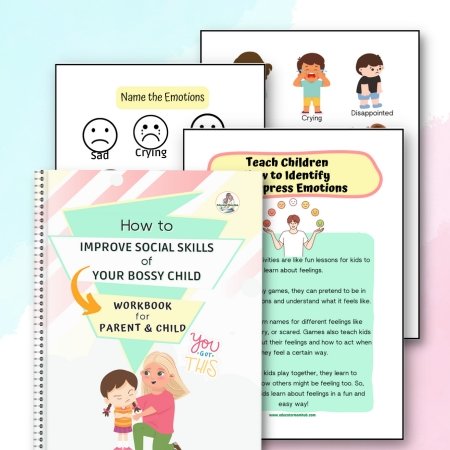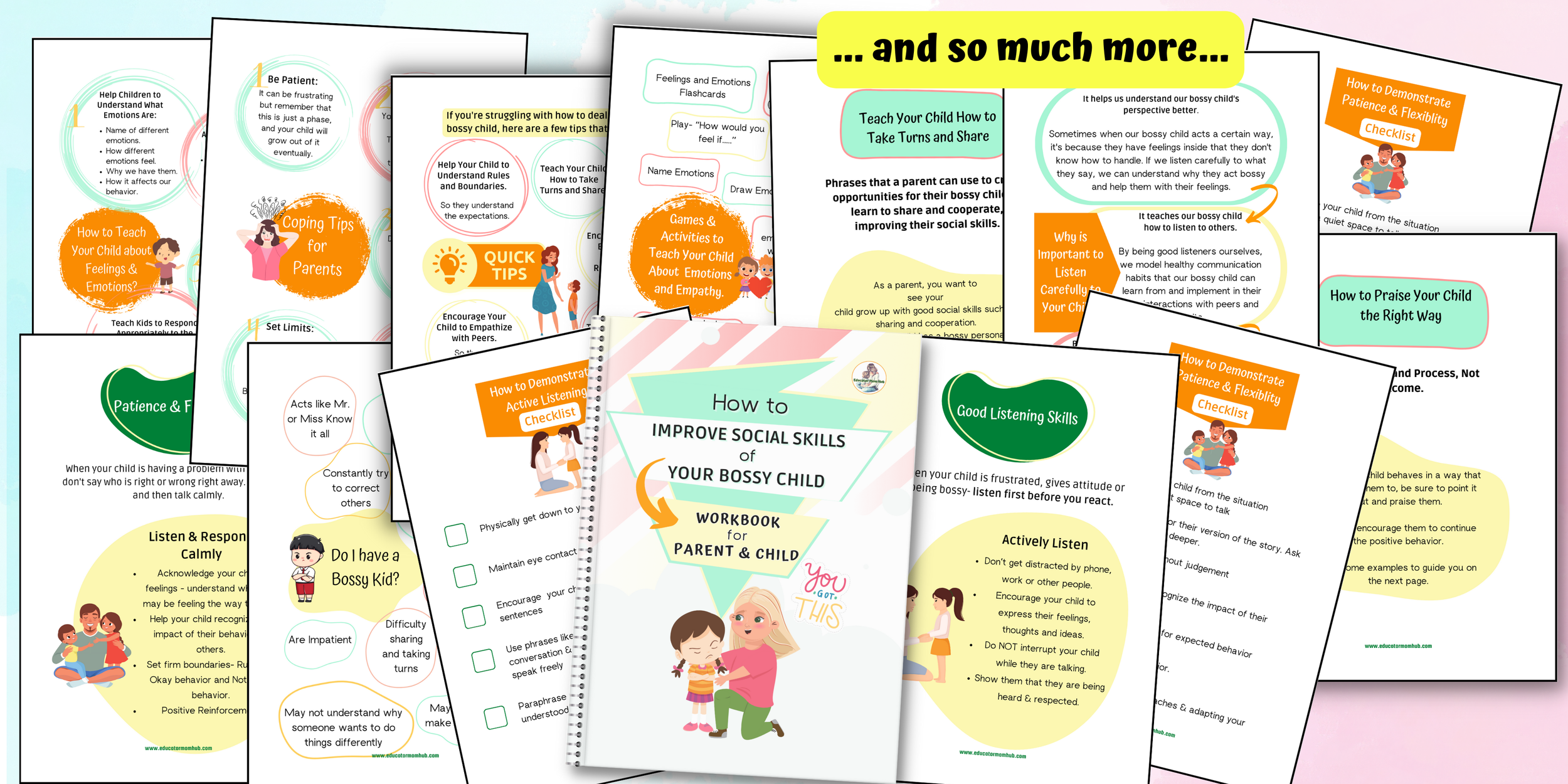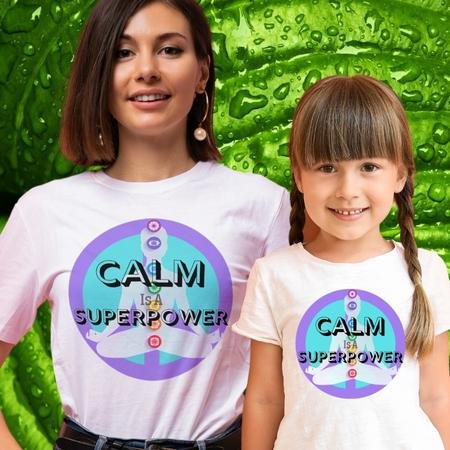How to Teach Self-Regulation Skills to Pre-Schoolers
Disclaimer: This page contains affiliate links. If you choose to make a purchase after clicking a link, I may receive a small commission at no additional cost to you. Thank You for your support.
Self-regulation skills are important for children to develop as they grow. These skills can help them regulate their emotions, stay on task, and make good decisions.
Children who struggle with self-regulation may have difficulty completing tasks or controlling their behavior. They may also be more susceptible to stress and anxiety.
In this blog post, we will discuss what self-regulation is, the four self-regulation skills, why it is important for wellbeing, and how you can teach these skills to your child.
We will also provide some helpful tips and activities that can promote emotional regulation in preschoolers!
What is Self-Regulation and Why is it Important for Children to Develop These Skills?
Self-regulation is a critical life skill for children’s well-being.
It enables them to control their emotions, behaviors, and thoughts.
When children learn to self-regulate, they are better able to cope with stressors and setbacks.
This leads to improved mental health and overall well-being.
It helps children develop healthy relationships.
When they can manage their emotions and behavior, they are less likely to lash out verbally or physically at others.This makes it easier for children to forge positive relationships with classmates, family members, and friends.
Self-regulation also plays an important role in academic success. Children who can regulate their emotions and behavior are better able to focus in school and stay on task.
As a result, they tend to perform better academically.
Finally, self-regulation is key to good physical health.
When children can manage their emotions and impulses, they have more self-discipline and are less likely to engage in risky behaviors like drug abuse or unsafe sex.
This reduces their risk of developing chronic health problems later in life.
Overall, self-regulation is a crucial life skill that benefits children’s well-being in many ways.
By learning how to regulate their emotions, behaviors, and thoughts, children can lead happier, healthier lives.
The Four Self-Regulation Skills
There are four main self-regulation skills that children can learn:
emotional regulation
behavioral regulation,
attention regulation,
and cognitive regulation.
1. Emotional Regulation:
Emotional regulation is the ability to manage and understand emotions.
It is an important skill for preschoolers because it helps them develop healthy relationships and cope with stress.
Emotional regulation skills allow children to express their own feelings constructively, and to respond appropriately to the feelings of others.
It is important for children to be able to identify their own emotions and how they are feeling.
When children can understand why they are feeling a certain way, they can take steps to manage those feelings.
For example, when a child recognizes that they are feeling angry because they are hungry, they can find something to eat.
This can be helpful in relationships, school, and work.
Behavioral Regulation
Behavioral regulation is the ability to control one's own behavior. It involves the ability to inhibit impulsive responses.
It is important for preschoolers because it helps them learn how to behave in social situations.
It also helps them learn how to control their emotions and respond appropriately to different situations.
Waiting/ turn-taking games like 'musical chairs, snakes and ladders, and ball games are great for teaching patience and inhibiting impulses.
Attention Regulation
Attention regulation is the ability to focus and stay on task.
It is important for preschoolers because it helps them stay focused in class, follow directions, and learn new skills.
Attention regulation can be improved through practice and activities that challenge a child's focus.
Some helpful exercises include puzzles, coloring, and counting.
Cognitive Regulation
Cognitive regulation is the ability to control one's thoughts and emotions.
This is important because if they can't regulate their emotions and thoughts, it can lead to problems in school and with relationships.
Cognitive regulation helps preschoolers focus on tasks, stay calm and organized, and make good decisions.
Cognitive regulation can be taught through strategies such as positive reinforcement, breathing exercises, and visualization.
How do I Know If My Child Struggles with Self-Regulation?
If you are concerned that your child may struggle with self-regulation, there are some signs to look for.
Signs that your child may have difficulty regulating their emotions include:
mood swings, outbursts, tantrums, or feeling easily overwhelmed.
Signs that your child may have difficulty regulating their behavior include:
impulsivity, acting without thinking, difficulty following rules or instructions, or disruptive behavior.
Signs that your child may have difficulty regulating their attention include:
inattention, distractibility, or hyperactivity.
If you notice any of these signs in your child, it is important to talk to their doctor or mental health professional.
Why is Emotional Dysregulation Harmful to Children?
One of the most important things for preschoolers is to develop a sense of self and learn how to regulate their emotions.
When a child is emotionally dysregulated, it can be difficult for them to learn and process new information.
For example, when a child has regular tantrums, it can disrupt their ability to learn and make friends, as other children may be scared or intimidated by their behavior.
Tantrums can be physically harmful to the child, as they may injure themselves or others in the process.
Emotional dysregulation can lead to behavioral problems and lack of social skills for difficulty in forming relationships with others.
For example, a child who is emotionally dysregulated may have trouble making and keeping friends. They may also act out in school or at home, which can lead to problems with authority figures.
Here is are Simple Games and Activities to Boost Your Child's Emotional Intelligence and Social Skills.
Parenting Tips and Strategies for Teaching Self-Regulation Skills to Pre-schoolers
It can be difficult for preschoolers to regulate their emotions and behaviors.
However, there are some parenting tips and strategies that can help teach self-regulation skills to preschoolers.
Help Pre-schoolers Understand and Manage Their Feelings
Teach children how to identify and label their emotions.
Use books, games, and activities to help preschoolers understand their feelings.
Feelings and Emotions cards are a great way to teach children how to recognize and name different emotions.
Here is a helpful article- How to Teach Kids About Feelings and Emotions
Teach Emotional Vocabulary
Helping your child to label their emotions will help them to understand and cope with their feelings and behavioral responses.
For example, "It sounds like you're feeling frustrated because you can't build the block tower by yourself. Maybe you could ask for help from your friends."
Encourage Preschoolers to Express Their Feelings in Appropriate Ways.
Teach children how to use words to express their emotions instead of hitting, kicking, or biting.
A little spot of emotions books is a good way to teach children about emotions and how to deal with their emotions.
The tips in the books for managing emotions are helpful to both the parent and the child.
Provide Opportunities for Pre-schoolers to Practice Self-Regulation Skills.
Give them time to calm down after they get upset.
A designated calming corner or space gives children a safe place to retreat when they are feeling overwhelmed with big emotions and allows them time and space for practicing self-regulation and improving self-regulation skills.
Here is an article- 7 Reasons Why All Kids Need A Calming Corner And How To Create One
'Time In'
'Time In' can be an effective method for teaching self-regulation to preschoolers.
During 'Time In' parent closely monitors their overwhelmed kids and takes time to listen to and understand their big emotions, even when they are behaving unacceptably.
This helps a child learn how to talk about their feelings and work through them, rather than just suppressing them.
This helps children develop emotional intelligence and can help stop future behavioral issues.
Here is a helpful article- Time In or Time Out? Which is Better for Your Child?
Model Self-Regulation for Preschoolers.
Let them see you using self-regulation skills in your own life.
Explain to them what you are doing and why it is important.
For example, “I am taking some deep breaths because I feel angry. Deep breathing helps me calm down so that I can think more clearly.”
Teach Preschoolers How to Take Breaks.
When children begin to recognize their big feelings, such as overwhelm, frustration, and anger, encourage them to self-regulate by taking a break.
Teach self-regulation strategies such as deep breathing, going for a walk, or listening to calming music to help them relax.
Encourage Preschoolers to Use Positive Self-Talk.
Teach them how to talk to themselves in a positive way when they are feeling upset or frustrated.
For example, "I can do this" or "I am feeling upset, but I will be okay."
Make Sure Preschoolers Get Enough Sleep.
Sleep is important for self-regulation.
A tired child is more likely to be emotionally dysregulated.
Make sure your child is getting enough sleep every night.
Here is an article with 11 Guaranteed Benefits of Having a Bedtime Routine for Kids
Teaching Preschoolers Coping Strategies for Stressful Situations
Teach children self-regulation strategies.
Help them brainstorm different ways to deal with stressful situations and calm down their big emotions.
For example, teach them to ask for help from an adult, take a break, or use positive self-talk.
This article may help you How To Calm Kids Down From Strong Emotions
Encourage Preschoolers to be Active Every Day.
Outdoor play may help improve children's moods when they feel frustrated.
Fresh air and physical activity can help release pent-up energy, helping kids self-regulate.
It is important to find an activity that your child enjoys and make it part of their daily routine.
Encouraging Healthy Daily Routines for Preschoolers
Establishing a daily routine can help preschoolers feel more in control and less overwhelmed.
Routines should include regular times for meals, sleep, physical activity, and relaxation.
Visual routines like Bedtime Routine charts or daily routine charts are effective self-regulation tools.
It helps children understand the next event of the day and can help children remain calm during transition times (e.g., transitioning from playtime to lunchtime).
Here is an article on How To Manage Children's Behaviour With Daily Routine Charts. (Find a FREE template for making a daily chart routine for your child.)
Creating a Positive and Supportive Home Environment for Preschoolers
Make sure your home is a safe and supportive place for preschoolers to express their emotions.
Encourage open communication and provide opportunities for them to talk about their feelings.
One way to do this is to spend some quality time with children every day.
This will allow you to understand the reasons for your child's challenging behavior which will then help you apply specific strategies for teaching your child self-regulation skills.
For example, you may now know that your child doesn't know how to verbally ask for a turn which leads to hitting amongst siblings. Now you can use their playtime as teachable moments.
Here is a helpful article What Happens When Parents Spend More Quality Time With Children
Positive Reinforcement
Praise your child when they use self-regulation skills.
Paying attention to their positive behaviors plays a huge role in helping children feel good about themselves and encourages them to continue using these skills for desirable behavior.
For example, "I'm so proud of you for using your words instead of hitting."
Here is a helpful article How to Praise Your Child The Right Way- 65 Examples
Limit Screen Time
Too much screen time can lead to attention and self-regulation problems in children.
It is important to limit screen time and make sure that preschoolers are getting enough physical activity, sleep, and face-to-face interactions.
-Setting Limits
It is important to set limits with preschoolers in a way that is respectful and supportive.
Clear expectations will help them to understand what is expected of them and feel more in control.
For example, "I know you're upset but it's not okay to hit."
Here is an article to help you How to Set Limits for Kids- 9 Tips for Behaviour Management
Providing Choices
Giving your child choices can help them to feel more in control and less frustrated.
For example, "Do you want to wear the blue shirt or the green shirt today?" Both choices ensure that your child will be getting dressed but without drama, as now your child feels more in control of the situation.
Teach Them to Become More Resilient
One of the best things you can do for your child is to teach them how to become more resilient.
Resilient children are better at problem-solving, can cope with stress and setbacks with more self-control, and form better social relationships because of it.
Reading age-appropriate books about resilience can help children understand what being resilient is and how to solve real life problems by thinking outside the box.
Here is an article with 17 Tips on How to Help Your Child Become More Resilient
Practicing Mindfulness
Mindfulness is a state of being present in the moment without judgment.
Guided meditation, breathing exercises, and yoga are all ways to help preschoolers practice mindfulness and regulate intense emotions and negative thoughts.
Mindfulness can be a helpful tool for preschoolers to use for self-awareness when they are feeling overwhelmed or frustrated.
Here is a helpful article on How to Teach Mindfulness to Kids: 26 Fun and Easy Ways to Get Started!
Conclusion
Teaching self-regulation skills to preschoolers is important for their well-being.
It can help them to cope with stress, manage intense emotions, and form better social relationships.
There are many ways you can support your child in learning these skills including providing a positive and supportive home environment, setting limits, teaching them to become more resilient, and practicing mindfulness.
What other tips do you have for teaching self-regulation skills to preschoolers?
Share in the comments below!
FAQ
Q: Why is self-regulation important?
Self-regulation is important for well-being because it can help children to cope with stress, manage intense emotions, and form better social relationships.
It is also a skill that can be used throughout life.
Q: How do I know if my child is struggling with self-regulation?
If your child is having difficulty following rules, staying on task, or controlling their emotions, they may be struggling with emotional self-regulation.
It is important to talk to your child's doctor or a mental health professional if you are concerned about your child's self-regulation skills.
Q: What are some other ways I can support my child self-regulate?
Some other ways you can support your child in learning self-regulation skills include providing a positive and supportive home environment, setting limits, teaching them to become more resilient, and practicing mindfulness. You can also talk to your child's doctor for additional support.
Q: What activities help with self-regulation?
Some activities that can help with self-regulation include yoga, breathing exercises, and guided meditation. These activities can help pre-schoolers to become more aware of their emotions and how to control them.
Q: What are some self-regulation strategies?
Some self-regulation strategies include taking breaks, using positive self-talk, and thinking about how your actions will affect others. These strategies can help children to cope with intense emotions and manage their behavior.













